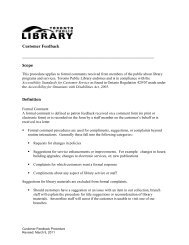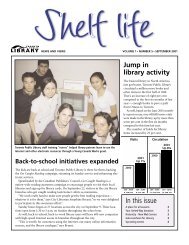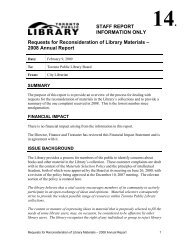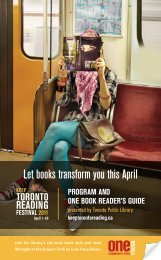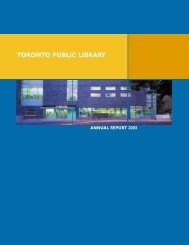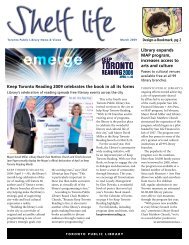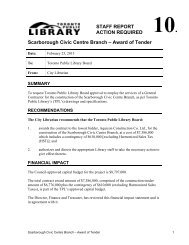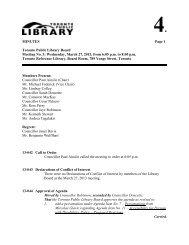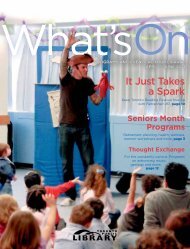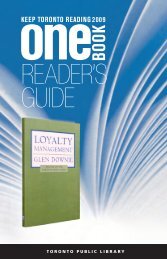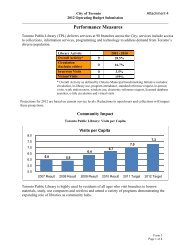âThe Great Pegram Mysteryâ (PDF) - Toronto Public Library
âThe Great Pegram Mysteryâ (PDF) - Toronto Public Library
âThe Great Pegram Mysteryâ (PDF) - Toronto Public Library
Create successful ePaper yourself
Turn your PDF publications into a flip-book with our unique Google optimized e-Paper software.
THE GREAT PEGRAM<br />
MYSTERY.<br />
( W ith apologies to Dr. Cona" Doyle, a1zd our mutuai<br />
and lamented friend the late Sherlock H olmes.)<br />
I DROPPED in on my friend, Sherlaw Kombs,<br />
to hear what he had to say about the <strong>Pegram</strong><br />
mystery, as it had come to be called in the<br />
newspapers. I found him playing the violin<br />
with a look of sweet peace and serenity on his<br />
face, which I never noticed on the countenan- .<br />
ces of those within hearing distance. I knew<br />
this expression of seraphic calm indicated that<br />
Kombs had been deeply annoyed about something.<br />
. Such, indeed, proved to be the case,<br />
for one of the morning papers had contained an<br />
article, eulogizing the alertness and general<br />
competence of Scotland Yard. So great was<br />
Sherlaw Kombs's contempt for Scotland Yard<br />
that he never would visit Scotland during his<br />
vacations, nor would he ever admit that a<br />
Scotchman was fit for anything but export.<br />
He generously put away his violin, for he had<br />
a sincere liking for me, and greeted me with<br />
his usual kindness. .<br />
"I have come," I began, plunging at once<br />
into the matter on my mind, "to hear what you<br />
think of the great <strong>Pegram</strong> mystery."<br />
"I haven't heard of it," he said quietly, just<br />
as if all London were not talking of that very<br />
thing. Kombs was curiously ignorant on some
112 \tbe jface an~ tbe Mash.<br />
subjects, and abnormally learned on others.<br />
I found, for instance, that political discussion<br />
with him was impossible, because he did not<br />
know who Salisbury and Gladstone were.<br />
This made his friendship a great boon.<br />
" The <strong>Pegram</strong> mystery has baffled even Gregory,<br />
of Scotland Yard."<br />
" I can well believe it," said my friend, calmly.<br />
"Perpetual motion, or squaring the circle,<br />
would baffle Gregory. He's an infant, is Gregory."<br />
This was one of the things I always liked<br />
about Kombs. There was no professional jealousy<br />
in him, such as characterizes so many<br />
other men.<br />
He filled his pipe, threw himself into his<br />
deep·seated arm-chair, placed his feet on the<br />
mantel, and clasped his hands behind his head.<br />
" Tell me about it," he said simply.<br />
" Old Barrie Kipson," I began, "was a stockbroker<br />
in the City. He lived in <strong>Pegram</strong>, and it<br />
was his custom to--"<br />
" COME IN ! ,. shouted Kombs, without changing<br />
his position. but with a suddenness that<br />
startled me. I had heard no knock.<br />
" Excuse me," said my friend, laughing, " my<br />
invitation to enter was a trifle premature. I<br />
was really so interested in your recital that I<br />
spoke before r thought, which a detective should<br />
never do. The fact is, a man will be here in a<br />
moment who will tell me all about this crime,<br />
and so you·will be spared further effort in that<br />
line."<br />
"Ah, you have an appointment. In that<br />
case I will not intrude," I said, rising.<br />
"Sit down; I have no appointment. I did<br />
not know until I spoke that he was coming."<br />
I gazed at him in amazement. Accustomed<br />
as I was to his extraordinary talents, the man<br />
was a perpetual surprise to me, He continued
'Ctbe <strong>Great</strong> lDegram .M'!2ster'!2. 113<br />
to smoke quietly. but evidently enjoyed myconstern<br />
at ion.<br />
"I see you are surprised. It is really too<br />
simple to talk about. but. from my position opposite<br />
the mirror. I can see the reflection of<br />
. objects in the street. A man stopped. looked<br />
at one of my cards. and then glanced across<br />
the street. I recognized my card. because. as<br />
you know. they are all in scarlet. If. as you<br />
say. London is talking of this mystery. it naturally<br />
follows that he will talk of it. and the<br />
chances are he wished to consult me about it.<br />
Anyone can see that. besides there is always<br />
-Comein!"<br />
There was a rap at the door this time.<br />
A stranger entered. Sherlaw Kombs did not<br />
change his lounging attitude.<br />
"I wish to see Mr. Sherlaw Kombs, the detective."<br />
said the stranger. coming within the<br />
range of the smoker's vision.<br />
" This is Mr, Kombs." I remarked at last. as<br />
my friend smoked quietly. and seemed halfasleep.<br />
" Allow me to introduce myself." continued<br />
the stranger. fumbling for a card.<br />
"There is no need. You are a journalist."<br />
said Kombs.<br />
" Ah." said the stranger. somewhat taken<br />
aback. "you know me. then."<br />
"Never saw or heard of you in my life before.<br />
"<br />
" Then how in the world--"<br />
" Nothing simpler. You write for an evening<br />
paper. You have written an article slating the<br />
book of a friend. He will feel badly about it.<br />
and you will condole with him. He will never<br />
know who stabbed him unless I tell him."<br />
"The devil!" cried the journalist. sinking<br />
into a chair and mopping his brow. while his face<br />
became livid.
114 ttbe 3face an~ tbe .Mash.<br />
H Yes," drawled Kombs, H it is a devil of a<br />
shame that such things are done. But what<br />
would you? as we say in France."<br />
When the journalist had recovered his second<br />
wind he pulled himself together somewhat .<br />
.. Would you object to telling me how you know<br />
these particulars about a man you say you have<br />
never seen? "<br />
H I rarely talk about these things," said Kombs<br />
with great composure. H But as the cultivation<br />
of the habit of observation may help you in<br />
your profession, and thus in a remote degree<br />
benefit me by making your paper less deadly<br />
dull, I will tell you. Your first and second fingers<br />
are smeared with ink, which shows that<br />
you write a great deal. This smeared class embraces<br />
two sub-classes, clerks or accountants,<br />
and journalists. Clerks have to be neat in their<br />
work. The ink-smear is slight in their case.<br />
Your fingers are badly and carelessly smeared;<br />
therefore, you are a journalist. You have an<br />
evening paper in your pocket. Anyone might<br />
have any evening paper, bpt yours is a Special<br />
Edition, which will not be on the streets for<br />
half-an-hour yet. You must have obtained it<br />
before you left the office, and to do this you<br />
must be on the staff. A book-notice is marked<br />
with a blue pencil. A journalist always despises<br />
every article in his own paper not written by<br />
himself; therefore, you wrote the article you<br />
have marked, and doubtless are about to send<br />
it to the author of the book referred to. Your<br />
paper makes a specialty of abusing all books<br />
not written by some member of its own staff.<br />
That the author is a friend of yours, I merely<br />
surmised. It is all a trivial exa~ple of ordinary<br />
observation. "<br />
H Really, Mr. Kombs, you are the most wonderful<br />
man on earth. You are the equal of<br />
Gregory, by Jove, you are."
~be <strong>Great</strong> lPegral1l .M'gstet'g.<br />
II5<br />
A frown marred the brow of my friend as he<br />
placed his pipe on the sideboard and drew his<br />
self-cocking six-shooter.<br />
" Do you mean to insult me, sir?"<br />
"I do not-I-I assure you. You are fit to<br />
take charge of Scotland Yard to-morrow--.<br />
I am in earnest, indeed I am, sir."<br />
"Then Heaven help you," cried Kombs,<br />
slowly raising his right arm.<br />
I sprang between them.<br />
"Don't shoot!" I cried. " You will spoil<br />
the carpet. Besides, Sherlaw, don't you see the<br />
man means well. He actually thinks it is a<br />
compliment! "<br />
" Perhaps you are right," remarked the detective,<br />
flinging his revolver carelessly beside<br />
his pipe, much to the relief of the third party.<br />
Then, turning to the journalist, he said, with<br />
his customary bland courtesy-<br />
" You wanted to see me, I think you said.<br />
What can I do for you, Mr.Wilber Scribbings? "<br />
The journalist started.<br />
" How do you know my name?" he gasped.<br />
Kombs waved his hand impatiently.<br />
" Look inside your hat if you doubt your own<br />
name? "<br />
I then noticed for the first time that the name<br />
was plainly to be seen inside the top-hat<br />
Scribbings held upside down in his hands.<br />
" You have heard, of course, of the <strong>Pegram</strong><br />
mystery--"<br />
" Tush," cried the detective; "do not, I beg<br />
of you, call it a mystery. There is no such thing .<br />
. Life would become more tolerable if there ever<br />
was a mystery. Nothing is original. Everything<br />
has been done before. What about the<br />
<strong>Pegram</strong> affair? "<br />
" The <strong>Pegram</strong>-ah~case has baffled everyone.<br />
The Evening Blade wishes you to investigate,<br />
so that it may publish the result. It
II6<br />
\tbe gace anl) tbe .Mask.<br />
wiII .pay you well. Will you accept the commission<br />
?"<br />
"Possibly. Tell me about the case."<br />
" I thought everybody knew the particulars.<br />
Mr. Barrie Kipson lived at <strong>Pegram</strong>. He carried<br />
a first-class season ticket between the terminus<br />
and that station. It was his custom to leave<br />
for <strong>Pegram</strong> on the 5.30 train each evening.<br />
Some weeks ago, Mr. Kipson was brought<br />
down by the influenza. On his first visit to the<br />
City after his recovery, he drew something like<br />
£300 in notes, and left the office at his usual<br />
hour to catch the 5.30. He was never seen<br />
again alive, as far as the public have been able<br />
to learn. He was found at Brewster in a firstclass<br />
compartment on the Scotch Express,<br />
which does not stop between London and Brewster.<br />
There was a bullet in his head, and his<br />
money was gone, pointing plainly to murder<br />
and robbery."<br />
" And where is the mystery, may r ask? "<br />
" There are several unexplainable things<br />
about the case. First, how came he on the<br />
Scotch Express, which leaves at six, and does<br />
not stop at <strong>Pegram</strong>? Second, the ticket examiners<br />
at the terminus would have turned him<br />
out if he showed his season ticket; and all the<br />
tickets sold for the Scotch Express on the 21st<br />
are accounted for. Third, how could the murderer<br />
have escaped? Fourth, the passengers in<br />
the two compartments on each side of the one<br />
where the body was found heard no scuffle and<br />
no shot fired."<br />
"Are you sure the Scotch Express on the<br />
21st did not stop between London and Brewster?<br />
"<br />
"Now that you mention the fact, it did. It<br />
was stopped by signal just outside of <strong>Pegram</strong>.<br />
There was a few moments' pause, when the<br />
line was reported clear, and it went on again.
ttbe <strong>Great</strong> lDegram Ln~ster~. 117<br />
This frequently happens, as there is a branch<br />
line beyond <strong>Pegram</strong>."<br />
Mr. Sherlaw Kombs pondered for a few<br />
moments, smoking his pipe silently.<br />
" I presume you wish the solution in time for<br />
to-morrow's paper? " .<br />
"Bless my soul, no. The editor thought if<br />
you evolved a theory in a month you would do<br />
well."<br />
" My dear sir, I do not deal with theories,<br />
but with facts. If you can make it convenient<br />
to call here to·morrow at 8 a. m. I will give you<br />
the full particulars early enough for the first edition.<br />
There is no sense in taking up much time<br />
over so simple an affair as the <strong>Pegram</strong> case.<br />
Good afternoon, sir."<br />
Mr. Scribbings was too much astonished to<br />
return the greeting. He left in a speechless<br />
condition, and I saw him go up the street with<br />
his hat still in his hand.<br />
Sherlaw Kombs relapsed into his old lounging<br />
attitude, with his hands clasped behind his<br />
head. The smoke came from his lips in quick<br />
puffs at first, then at longer intervals. I saw he<br />
was coming to a conclusion, so I said nothing.<br />
Finally he spoke in his most dreamy manner.<br />
" I do not wish to seem to be rushing things<br />
at all, Whatson, but I am going out to-night on<br />
the Scotch Express. Would you care to accompany<br />
me ? "<br />
"Bless me!" I cried, glancing at the clock,<br />
"you haven't time, it is after five now."<br />
" Ample time, Whatson-ample," he murmured,<br />
without changing his position. "I give<br />
myself a minute and a half to change slippers<br />
and dressing gown for boots and coat, three<br />
seconds for hat, twenty-five seconds to the<br />
street, forty-two seconds waiting for a hansom,<br />
and then seven at the terminus before the express<br />
starts. I shall be glad of your company."
118 ~be gace an~ tbe .Mask.<br />
I was only too happy to have the privilege of<br />
going with him. It was most interesting to<br />
watch the workings of so inscrutable a mind.<br />
As we drove under the lofty iron roof of the<br />
terminus I noticed a look of annoyance pass<br />
over his face.<br />
"We are fifteen seconds ahead of our time,"<br />
he remarked, looking at the big clock. "I dislike<br />
having a miscalculation of that sort occur."<br />
The great Scotch Express stood ready for its .<br />
long journey. The detective tapped one of the<br />
guards on the shoulder.<br />
" You have heard of the so-called <strong>Pegram</strong><br />
mystery, I presume? "<br />
"Certainly, sir. It happened on this very<br />
train, sir."<br />
" Really? Is the same 'carriage still on the<br />
.train? "<br />
"Well, yes, sir, it is," replied the guard, lowering<br />
his voice, "but of course, sir, we have to<br />
.keep very quiet about it. People wouldn't<br />
travel in it, else, sir."<br />
" Doubtless. Do you happen to know if<br />
anybody occupies the compartment in which the<br />
body was found? "<br />
" A lady and gentleman, sir; I put 'em in<br />
myself, sir."<br />
"Would you further oblige me," said the de-<br />
; tective, deftly slipping half-a-sovereign into the<br />
hand of the guard, "by going to the window<br />
and informing them in an offhand casual sort<br />
of way that the tragedy took place in that compartment?<br />
"<br />
"Certainly, sir."<br />
We followed the guard, and the moment he<br />
had imparted his news there was a suppressed<br />
scream in the carriage. Instantly a lady came<br />
out, followed by a florid-faced gentleman, who<br />
scowled at the guard. We entered the now<br />
empty compartment, and Kombs said:
\tbe (i;reat 1l)egram .Mogsterog. 119<br />
" We would like to be alone here until we<br />
reach Brewster."<br />
"I'll see to that, sir," answered the guard,<br />
locking the door.<br />
When the official moved away, I asked my<br />
friend what he expected to find in the carriage<br />
that would cast any light on the case.<br />
"Nothing," was his brief reply.<br />
" Then why do you come? "<br />
.. Merely to corroborate the conclusions I<br />
have already arrived at."<br />
.. And may I ask what those conclusions are? "<br />
.. Certainly," replied the detective, with a<br />
touch of lassitude in his voice. .. I beg to call<br />
your attention, first, to the fact that this train<br />
stands between two platforms, and can be entered<br />
from either side. Any man familiar with<br />
the station for years would be aware of<br />
that fact. This shows how Mr. Kipson entered<br />
the train just before it started."<br />
.. But the door on this side is locked," I objected,<br />
trying it.<br />
" Of course. But every season ticket-holder<br />
carries a key. This accounts for the guard not<br />
seeing him, and for the absence of a ticket.<br />
Now let me give you some information about<br />
the influenza. The patient's temperature rises<br />
several degrees above normal, and he has a<br />
fever. When the malady has run its course,<br />
the temperature falls to three-quarters of a degree<br />
below normal. These facts are unknown<br />
to you, I imagine, because you are a doctor."<br />
I admitted such was the case.<br />
"Well, the consequence of this fall in temperature<br />
is that the convalescent's mind turns<br />
toward thoughts of suicide. Then is the time he<br />
should be watched by his friends. Then was the<br />
time Mr. Barrie Kipson's friends did not watch<br />
him. You remember the 21st, of course. No?<br />
It was a most depressing day. Fog all around
120 ttbe jface an~ tbe Mask.<br />
and mud under foot. Very good. He resolves<br />
on suicide. He wishes to be unidentified, if<br />
possible but forgets his season ticket. Myexperience<br />
is that a man about to commit a crime<br />
always forgets something."<br />
" But how do you account for the disappearance<br />
of the money? "<br />
"The money has nothing to do with the<br />
matter. If he was a deep man, and knew the<br />
stupidness of Scotland Yard, he probably sent<br />
the notes to an enemy. If not, they may have<br />
been given to a friend. Nothing is more calculated<br />
to prepare the mind for self-destruction<br />
than the prospect of a night ride on the Scotch<br />
Express, and the view from the windows of the<br />
train as it passes through the northern part of<br />
London is particularly conducive to thoughts of<br />
annihilation. "<br />
.. What became of the weapon? "<br />
"That is just the point on which I wish to<br />
satisfy myself. Excuse me for a moment."<br />
"Mr. Sherlaw Kombs drew down the window<br />
on the right hand side, and examined the<br />
top of the casing minutely with a magnifying<br />
glass. Presently he heaved a sigh of relief, and<br />
drew up the sash.<br />
" Just as I expected," he remarked, speaking<br />
more to himself than to me. " There is a slight<br />
dent on the top of the window-frame. It is of<br />
such a nature as to be made only by the trigger<br />
of a pistol falling from the nerveless hand of a<br />
suicide. He intended to throw the weapon far<br />
out of the window, but had not the strength.<br />
It might have fallen into' the carriage. As a<br />
matter of fact, it bounced away from the line<br />
and lies among the grass about ten feet six<br />
inches from the outside rail. The only question<br />
that now remains is where the deed was committed,<br />
and the exact present position of the<br />
pistol reckoned in miles from London, but that,
\tbe <strong>Great</strong> lDegram .M'!2ster'!2. 121<br />
fortunately, is too simple to even need explanation."<br />
.. <strong>Great</strong> heavens, Sherlaw !" I cried. "How<br />
can you call that simple? It seems to me impossible<br />
to compute."<br />
We were now flying over Northern London,<br />
and the great detective leaned back with every<br />
sign of ennui, closing his eyes. At last he<br />
spoke wearily:<br />
" It is really too elementary, Whatson, but I '<br />
am always willing to oblige a friend. I shall be<br />
relieved, however. when you are able to work<br />
out the ABC of detection for yourself, although<br />
I shall never object to helping you with the<br />
words of more than three syllables. Having<br />
made up his mind to commit suicide. Kipson<br />
naturally intended to do it before he reached<br />
Brewster, because tickets are again examined at<br />
that point. When the train began to stop at the<br />
signal near <strong>Pegram</strong>, he came to the false conclusion<br />
that it was stopping at Brewster. The<br />
fact that the shot was not heard is accounted<br />
for by the screech of the air-brake, added to<br />
the noise of the train. Probably the whistle<br />
was also sounding at the same moment. The<br />
train being a fast express would stop as near<br />
the signal as possible. The air-brake will stop<br />
a train 10 twice its own length. Call it three<br />
times in this case. Very well. At three times<br />
the length of this train from the signal post towards<br />
London, deducting half the length of<br />
the train, as this carriage is in the middle, you<br />
will find the pistol."<br />
"Wonderful!" I exclaimed.<br />
"Commonplace," he murmured.<br />
At this moment the whistle sounded shrilly,<br />
and we felt the grind of the air-brakes.<br />
"The <strong>Pegram</strong> signal again," cried Kombs,<br />
with something almost like enthusiasm.
122 ~be jface ant) tbe lI~asJt.<br />
"This is indeed luck. We will get out here,<br />
Whatson, and test the matter."<br />
As the train stopped, we got out on the righthand<br />
side of the line. The engine stood panting<br />
impatiently under the red light, which<br />
changed to green as I looked at it. As the train<br />
moved on with increasing speed, the detective<br />
counted the carriages, and noted down the<br />
number. It was now dark, with the thin crescent<br />
of the moon hanging in the western sky throwing<br />
a weird half-light on the shining metals.<br />
The rear lamps of the train disappeared around<br />
a curve, and the signal stood at baleful red<br />
again. . The black magic of the lonesome night<br />
in that strange place impressed me, but the<br />
detective was a most practical man. He placed<br />
his back against the signal-post, and paced up<br />
the line with even strides, counting his steps.<br />
I walked along the permanent way beside him<br />
silently. At last he stopped, and took a tapeline<br />
from his pocket. He ran it out until the<br />
ten feet six inches were unroIled, scanning the<br />
figures in the wan light . of the new moon.<br />
Giving me the end, he placed his knuckles on<br />
the metals, motioning me to proceed down the<br />
embankment. I stretched out the line, and then<br />
sank my hand in the damp grass to mark the<br />
spot.<br />
"Good God!" I cried, aghast, "what is<br />
this? "<br />
" It is the pistol," said Kombs quietly.<br />
It was!!<br />
* * * * * * * *<br />
Journalistic London will not soon forget the<br />
sensation that was caused by the record of the<br />
investigations of Sherlaw Kombs, as printed at<br />
length in the next day's Evenz1zg Blade.<br />
Would that my story ended here. Alas!<br />
Kombs contemptuously turned over the<br />
pistol to Scotland Yard. The meddlesome
Ube <strong>Great</strong> IDegram .Ml2sterr. 123<br />
officials, actuated, as I always hold, by jealousy,<br />
found the name of the seller upon it. They<br />
investigated. The seller testified that it had<br />
never been in the possession of Mr. Kipson, as<br />
far as he knew. It was sold to a man whose<br />
description tallied with that of a criminal long<br />
watched by the police. He was arrested, and<br />
turned Queen's evidence in the hope of hanging<br />
his pal. It seemed that Mr. Kipson, who was a I<br />
gloomy, taciturn man, and usually came home<br />
in a compartment by himself, thus escaping<br />
observation, had been murdered in the lane<br />
leading to his house. After robbing him, the<br />
miscreants turned their thoughts towards the<br />
disposal of the body-a subject that always<br />
occupies a first-class criminal mind before the<br />
deed is done. They agreed to place it on the<br />
line, and have it mangled by the Scotch Express,<br />
then nearly due. Before they got the body<br />
half-way up the embankment the express<br />
came along and stopped. The guard got out<br />
and walked along the other side to speak with<br />
the engineer. The thought of putting the body<br />
into an empty first-class carriage instantly<br />
occurred to the murderers. They opened the<br />
door with the deceased's key. It is supposed<br />
that the pistol dropped when they were hoisting<br />
the body in the carriage. .<br />
The Queen's evidence dodge didn't work,<br />
and Scotland Yard ignobly insulted my friend<br />
Sherlaw Kombs by sending him a pass to see<br />
"the villains hanged.



